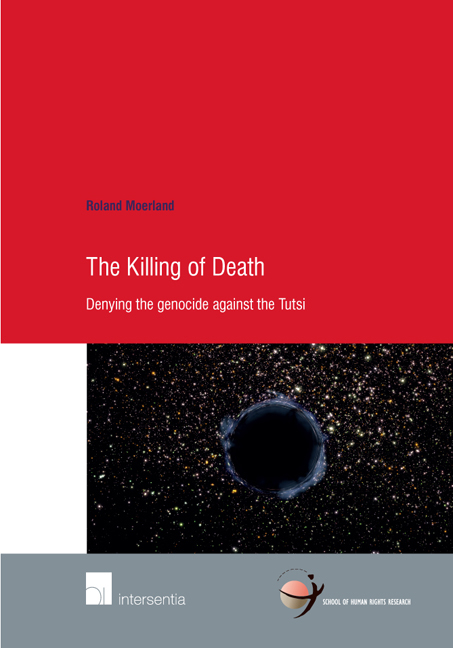Book contents
- Frontmatter
- Dedication
- Preface
- Contents
- List of abbreviations
- Table of figures
- Introduction
- Part I Exploration
- Chapter 2 Genocide and denial
- Chapter 3 Genocide denialism
- Part II Inspection
- Part III Reflection
- Chronological overview of significant interviews, consultations and events
- Selected bibliography
- Curriculum vitae
- School of Human Rights Research Series
Chapter 3 - Genocide denialism
from Part I - Exploration
Published online by Cambridge University Press: 21 September 2018
- Frontmatter
- Dedication
- Preface
- Contents
- List of abbreviations
- Table of figures
- Introduction
- Part I Exploration
- Chapter 2 Genocide and denial
- Chapter 3 Genocide denialism
- Part II Inspection
- Part III Reflection
- Chronological overview of significant interviews, consultations and events
- Selected bibliography
- Curriculum vitae
- School of Human Rights Research Series
Summary
Introduction
The analysis of the dimensions of genocide in the last Chapter culminated in a discussion of some of the main explanatory frameworks (Chapter 2, Section 2.4). For the purpose of this study, the most relevant insight of the processual frameworks was that the phenomena of genocide and denial are closely interrelated and that, in these explanatory frameworks, genocide denial was generally designated as the last stage in the process of genocide. However, the discussion also revealed that the presence of denial cannot be limited to the last stage and instead denial seems to operate throughout the entire genocidal process. The discussion on the situationally dependent and dynamic nature of denial indicates that it assumes different functions and meanings depending on the specific situation and broader context in which it operates. This also applies to how denial operates throughout the genocidal process. To refer to all these particular functionalities simply as “genocide denial” obscures some of the fundamental differences in how denial functions in the context of genocide. Which function denial performs at which stage in the genocidal process therefore still requires further clarification. It would be more insightful to distinguish between specific types of denial according to their purpose in the genocidal process. This Chapter will start by looking more closely into how denial is related to genocide and what role/function denial performs at different stages throughout the process of genocide. This analysis will result in a typology of genocide denialism identifying various types of denial and other practices that facilitate the denial dynamic on which genocide thrives. The aim of the typology is to provide more clarity concerning the question how denial operates throughout the genocidal process. It will be suggested that the term “genocide denial” be reserved only for specific instances of denialist practices. Genocide denial as a specific type of genocide denialism will also be the main focus throughout the rest of this study.
Due to the lack of theoretical grounding and the self-explanatory use of the term genocide denial, it also remains unclear how it operates. How do actors deny? On what mechanisms do they rely? Scholars have revealed in their research the main linguistic or verbal strategies and mechanisms used in genocide denial, but a deeper analysis of how and why these mechanisms function and why such speech is problematic is rarely given.
- Type
- Chapter
- Information
- The Killing of DeathDenying the genocide against the Tutsi Roland Moerland, pp. 97 - 134Publisher: IntersentiaPrint publication year: 2016



